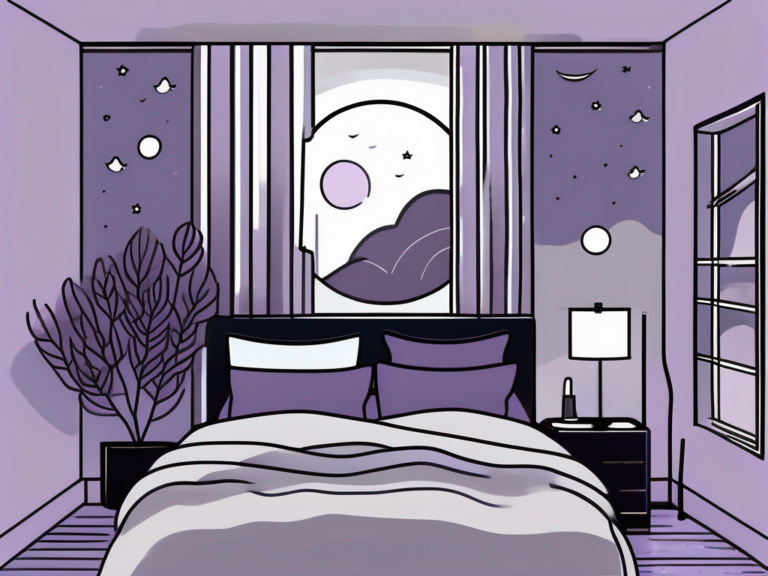Mandibular Nerve and Sleeping
Sleep plays a vital role in our overall health and well-being. It allows our body and mind to rest and rejuvenate, ensuring that we wake up refreshed and ready to take on the day. However, there are various factors that can impact the quality of our sleep, and one such factor is the mandibular nerve.
Understanding the Mandibular Nerve
The mandibular nerve is one of the three branches of the trigeminal nerve, which is responsible for sensation in the face and the movement of the jaw. It is the largest of the three branches and has both sensory and motor functions.
Anatomy of the Mandibular Nerve
The mandibular nerve originates from the trigeminal ganglion, located inside the skull. It then travels through a bony canal called the foramen ovale and branches out into various regions of the face and jaw.
As the mandibular nerve extends its reach, it gives rise to multiple important branches that contribute to the intricate sensory network of the face. One such significant branch is the buccal nerve, responsible for providing sensation to the cheek and the buccal mucosa. Additionally, the auriculotemporal nerve, another branch of the mandibular nerve, innervates the temporomandibular joint and the external ear, playing a crucial role in both sensation and motor function in these areas.
One of the branches of the mandibular nerve is the lingual nerve, which provides sensation to the tongue and plays a crucial role in taste perception. Another important branch is the inferior alveolar nerve, which supplies sensation to the lower teeth and the front two-thirds of the tongue.
Functions of the Mandibular Nerve
The mandibular nerve is not only responsible for providing sensation to the face and jaw but also plays a key role in the movement of the muscles involved in chewing and biting. It controls the opening and closing of the jaw, allowing us to perform essential functions such as eating and speaking.
Moreover, the mandibular nerve’s motor function extends beyond basic jaw movements. It also innervates the muscles responsible for certain facial expressions, such as the muscles involved in smiling and frowning. This intricate network of sensory and motor functions highlights the mandibular nerve’s vital role in both the functional and expressive aspects of the face.
The Connection Between the Mandibular Nerve and Sleep
While the mandibular nerve may not be directly related to sleep, it can indirectly affect the quality of our sleep due to its involvement in various conditions and disorders.
The Role of the Mandibular Nerve in Sleep
One of the conditions that can impact sleep is temporomandibular joint disorder (TMJ), which affects the joint that connects the jawbone to the skull. TMJ can cause pain and discomfort in the jaw, making it difficult to relax and fall asleep. It can also lead to teeth grinding and clenching, further disrupting sleep patterns.
In addition to TMJ, other mandibular nerve disorders such as trigeminal neuralgia, a condition characterized by severe facial pain, can also interfere with sleep. The constant pain and discomfort can make it challenging to find a comfortable sleeping position.
How the Mandibular Nerve Affects Sleep Quality
When the mandibular nerve is affected by a disorder or condition, it can result in disrupted sleep patterns and reduced sleep quality. Pain and discomfort in the jaw can make it difficult to fall asleep and stay asleep throughout the night.
Furthermore, conditions like TMJ can lead to teeth grinding and clenching during sleep, known as bruxism. This can cause additional problems such as headaches, jaw pain, and worn-out teeth, further deteriorating sleep quality.
Moreover, the mandibular nerve plays a crucial role in the sensation and movement of the lower jaw. It is responsible for transmitting sensory information from the lower teeth, gums, and lip, as well as controlling the muscles involved in chewing and speaking. Any disruption or damage to the mandibular nerve can result in numbness, tingling, or pain in these areas, affecting not only sleep but also daily activities.
Managing Mandibular Nerve-Related Sleep Issues
For individuals experiencing sleep disturbances due to mandibular nerve-related conditions, seeking treatment from a healthcare provider is essential. Treatment options may include physical therapy to alleviate jaw tension, medications to manage pain and inflammation, and dental interventions such as mouthguards to prevent teeth grinding during sleep.
Furthermore, practicing relaxation techniques before bedtime, maintaining good sleep hygiene, and avoiding caffeine and alcohol can also help improve sleep quality for individuals dealing with mandibular nerve issues.
Disorders Related to the Mandibular Nerve and Sleep
Several disorders and conditions affect the mandibular nerve, ultimately impacting sleep quality. Recognizing the symptoms and understanding their impact is crucial for seeking appropriate treatment.
The mandibular nerve, also known as the inferior alveolar nerve, is a branch of the trigeminal nerve responsible for providing sensory innervation to the lower teeth, gums, and lower lip. When this nerve is affected by various disorders such as trigeminal neuralgia, temporomandibular joint disorder (TMD), or nerve compression, it can lead to debilitating symptoms that extend beyond just oral health concerns.
Symptoms of Mandibular Nerve Disorders
The symptoms of mandibular nerve disorders can vary depending on the specific condition. However, common symptoms include facial pain, jaw pain, difficulty opening or closing the mouth, clicking or popping sounds when moving the jaw, headaches, and tooth sensitivity.
In addition to these symptoms, individuals with mandibular nerve disorders may also experience numbness or tingling in the lower face, shooting pain along the jawline, and muscle weakness that can affect chewing and speaking abilities. These symptoms can be triggered or exacerbated by activities such as chewing, talking, or even simple facial movements, making daily tasks a painful challenge for those affected.
Impact of Mandibular Nerve Disorders on Sleep
Mandibular nerve disorders can significantly disrupt sleep. The pain and discomfort can make it challenging to fall asleep and stay asleep throughout the night. The constant grinding and clenching of teeth associated with such disorders can also lead to sleep disruption and further exacerbate the symptoms.
Moreover, the relationship between mandibular nerve disorders and sleep disturbances is bidirectional. Poor quality sleep can worsen pain perception and lower the pain threshold, creating a vicious cycle of sleep deprivation and increased pain sensitivity. Addressing both the underlying nerve disorder and implementing strategies to improve sleep hygiene are essential components of comprehensive treatment for individuals struggling with these conditions.
Treatment Options for Mandibular Nerve Disorders
When it comes to treating mandibular nerve disorders, various options are available depending on the severity and underlying cause of the condition. Mandibular nerve disorders, also known as trigeminal nerve disorders, can cause significant pain and discomfort for individuals. The mandibular nerve is one of the branches of the trigeminal nerve, responsible for providing sensation to the lower jaw, teeth, and gums. Disorders of this nerve can result in sharp shooting pain, numbness, tingling, and even muscle weakness in the jaw.
Diagnosis of mandibular nerve disorders often involves a thorough examination by a healthcare professional, which may include imaging studies such as MRI or CT scans to identify the root cause of the issue. Once diagnosed, appropriate treatment can be recommended to alleviate symptoms and improve quality of life.
Non-Surgical Treatments
Non-surgical treatments for mandibular nerve disorders often focus on relieving pain and managing symptoms. This may include the use of pain medications, muscle relaxants, jaw exercises, physical therapy, and the application of heat or cold packs to alleviate discomfort. In addition to these interventions, some individuals may benefit from alternative therapies such as acupuncture or biofeedback to help manage pain and stress associated with the condition.
Surgical Treatments
In severe cases where non-surgical treatments fail to provide relief, surgical interventions may be considered. Procedures such as arthroscopy and open joint surgery can help repair damaged tissues and correct structural issues affecting the mandibular nerve. Surgical treatment is typically reserved for cases where conservative measures have been ineffective, and the individual’s quality of life is significantly impacted by the disorder.
Prevention and Management of Mandibular Nerve Disorders
While it may not always be possible to prevent mandibular nerve disorders, certain lifestyle changes and medical interventions can help manage symptoms and improve sleep quality. The mandibular nerve, also known as the inferior alveolar nerve, plays a crucial role in sensation for the lower teeth, gums, and lower lip. Disorders affecting this nerve can lead to symptoms such as pain, numbness, and tingling in the lower jaw area, impacting daily activities and sleep quality.
Understanding the importance of mandibular nerve health is essential for individuals experiencing symptoms related to this nerve. By implementing preventive measures and seeking appropriate care, individuals can effectively manage these disorders and improve their overall quality of life.
Lifestyle Changes for Better Sleep
Practicing good sleep hygiene is essential for promoting healthy sleep patterns. This includes maintaining a consistent sleep schedule, creating a relaxing sleep environment, practicing relaxation techniques before bed, and avoiding stimulants such as caffeine and electronic devices close to bedtime. Additionally, incorporating regular exercise into one’s routine can help regulate sleep patterns and promote overall well-being.
Medical Interventions for Mandibular Nerve Health
Regular dental check-ups and visits to a healthcare professional specializing in sleep medicine can help identify and address any underlying issues related to mandibular nerve disorders. These professionals can provide customized treatment plans tailored to individual needs, focusing on improving sleep quality and overall well-being. In some cases, oral appliances or splints may be recommended to alleviate symptoms and improve jaw alignment during sleep.
Furthermore, individuals experiencing persistent symptoms related to mandibular nerve disorders should seek evaluation by a healthcare provider to determine the underlying cause and explore appropriate treatment options. By addressing these issues proactively, individuals can effectively manage their symptoms and enhance their overall quality of life.
While the mandibular nerve may not be a widely recognized factor in sleep disturbance, its connection to conditions such as TMJ and trigeminal neuralgia highlights the importance of its health for optimal sleep quality. By understanding the functions, potential disorders, and available treatment options, individuals can seek appropriate care and support to enhance their sleep and overall quality of life.






